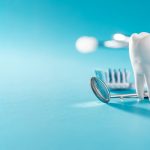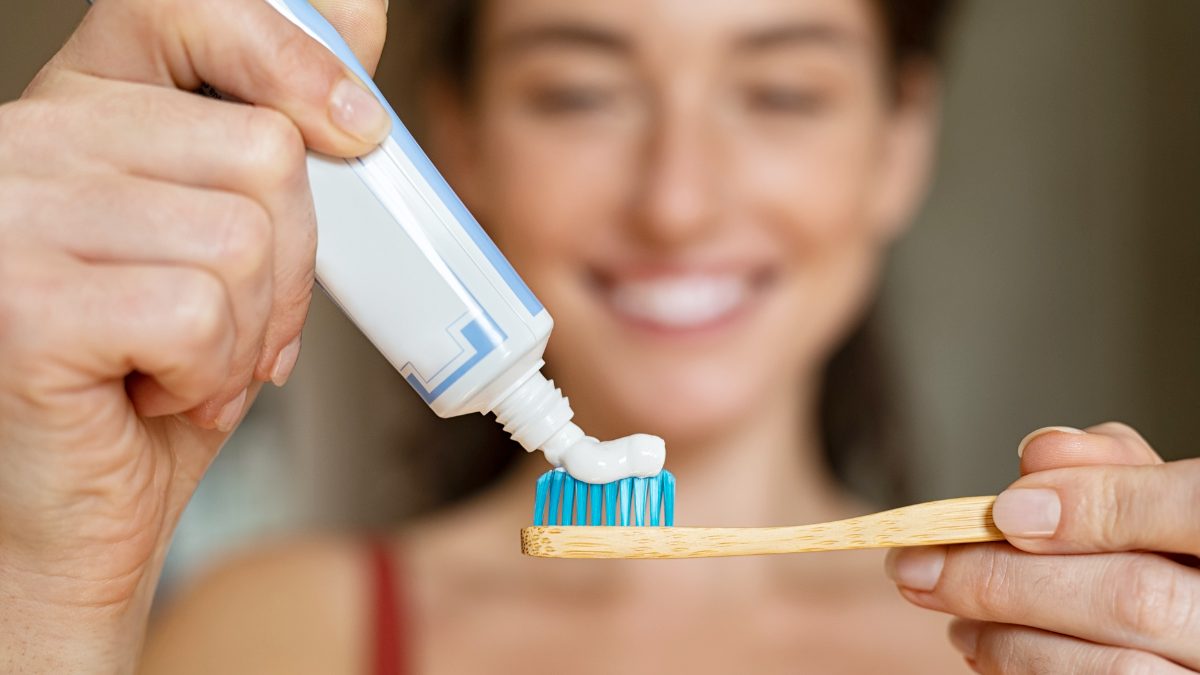
Why Do I Have White Spots on My Teeth?
August 28, 2023
Is Hydroxyapatite Safe?
September 29, 2023Key Takeaways:
Fluoride toothpaste is safe and effective:
The American Dental Association (ADA) and other health organizations support the use of fluoride in toothpaste to prevent cavities and strengthen teeth, as long as it’s used as directed.
Overuse can cause harm:
Excessive fluoride exposure can lead to issues like discolored teeth or even more serious health problems, but this typically occurs with overuse.
Proper usage is key:
For children, a rice-grain size for those under three and a pea-sized amount for older children and adults is recommended to ensure safety.
Sometimes, patients have seen an influencer or wellness celebrity warn them about fluoride. It’s not surprising that they sometimes ask, “Is fluoride toothpaste bad?”
Just about everything in medicine, including dental medicine, has some nuance to it. Medical professionals weigh the pros and cons of any medicine or therapy, including over-the-counter products like toothpaste.
Please remember this article contains general information and isn’t a substitute for personalized dental or medical care.
Why Dentists Recommend Fluoride Toothpaste
According to the American Dental Association (ADA), fluoride toothpaste is the gold standard for oral care once the person is old enough to know not to swallow it. The toothpaste must contain fluoride, meet specific standards for safety and effectiveness, and not contain ingredients that cause decay, like sugar, to receive the ADA seal of approval.
Researchers are looking into whether other ingredients like hydroxyapatite may also be effective, but more research is needed to determine whether it is as safe and effective as fluoride.
Fluoride is a naturally occurring mineral that helps strengthen, fortify, and remineralize the teeth. Using it as recommended by dentists helps:
- Prevent painful cavities
- Fight acids in the mouth, which are often caused by bacteria
- Reverse very early tooth decay by remineralizing the teeth
While fluoride is effective, too much fluoride can have adverse effects. Talk with your dentist for guidance, and look at the dosing directions on your toothpaste. For example, if it recommends a pea-sized portion of toothpaste, follow those directions closely.
Is Fluoride in Toothpaste Safe?
A strip of commercial toothpaste contains around 0.75 mg to 1 mg of fluoride. This is a much smaller fluoride concentration than the recognized toxic level of around 32 mg of fluoride for each kilogram of body weight.
At the lower levels, The American Dental Association (ADA) highlights that researchers spent over seven decades researching the safety of fluoride. This includes countless studies, and the experiences of over 210 million Americans collectively demonstrate that fluoridating water is an effective measure in cavity prevention and is safe for both children and adults.
It isn’t just the ADA; the CDC also recommends fluoride to protect the teeth against decay and demineralization. Most of the medical and dental care community supports the use of small amounts of fluoride in toothpaste to help prevent tooth decay.
The American Academy of Pediatrics offers specific guidelines for keeping kids safe using fluoride toothpaste. They recommend a rice grain-sized portion for children younger than three years old and a pea-sized amount after three years. They also suggest fluoride varnishes to protect young teeth, especially for children considered at-risk. Just be sure to teach kids not to swallow it. It won’t hurt them if they accidentally swallow a little, but it is still safest to establish a habit of not swallowing fluoride toothpaste.
However, it is essential not to overdo it, like any other over-the-counter or prescription health product or treatment. As researchers learn more, there may soon be alternatives that help further limit your fluoride exposure while also strengthening your teeth.
Overuse of fluoride can cause various health issues depending on how much fluoride you are exposed to. These include:
- Yellow or discolored teeth
- Weaker bones and joints
- Tooth decay in some cases of overuse
- High blood pressure
- Abdominal pain
- Thyroid problems
- Slow heartbeat
- Eye irritation
- Other issues including death
While many things can cause those symptoms, if you have new or intensifying symptoms, see a dentist or doctor immediately. The sooner the cause is identified, the sooner you can enjoy restored health.
Fortunately, people with fluoride in their water and who use toothpaste as directed twice a day are not likely to be exposed to enough fluoride to cause these problems. It is a natural mineral, and we know more about it than many other products people use every day. Despite the controversy, using fluoride in recommended ways and doses reduces how many cavities people get and, as a result, the infections, pain, and other side effects of tooth decay.
Taking Care of Your Teeth
Maintaining a regular at-home dental care routine is vital for your teeth’s health. This includes:
- Brush your teeth twice a day with a soft-bristled toothbrush and dentist-recommended toothpaste containing fluoride.
- Floss your teeth every day to remove bacteria below the gumline.
- Follow any additional recommendations from your dentist tailored to your specific needs, like using a remineralizing mouthwash or wearing a night mouthguard to protect your teeth at night.
- Schedule a professional cleaning and examination with your dentist twice a year.
In addition, eating healthy and adopting a lifestyle that promotes oral health is equally important. This involves:
- Drinking plain, still water keeps your mouth hydrated and dilutes mouth acids.
- Limit the intake of sugary and acidic drinks, such as soda, coffee, wine, and fruit juice. If you consume these beverages, aim to do so at specific times when you can gently brush your teeth about a half hour afterward.
- Eat a balanced diet. It’s worth noting that some healthy foods are acidic and can damage the teeth. These include citrus fruits, tomatoes, vinegar, and other acidic foods. Try to limit these to meal times, rinse your mouth with water immediately after eating, and gently brush your teeth 20-30 minutes post-meal.
- If you’re a smoker, it’s highly recommended to quit, as smoking has numerous harmful effects, including gum damage.
Your dental cleaning and examination appointments are the perfect opportunities to ask any questions you may have about the safety of fluoride toothpaste and other oral health products. We understand there is an overwhelming amount of information and misinformation out there. We are happy to help our patients navigate the information so they can feel more confident in their choices for themselves and their families.
If you’re located in or near Charlotte, NC, Southview Dentistry is ready to cater to your dental needs, whether it’s general preventative care or cosmetic dentistry. Don’t hesitate to reach out to us to schedule your appointment.




